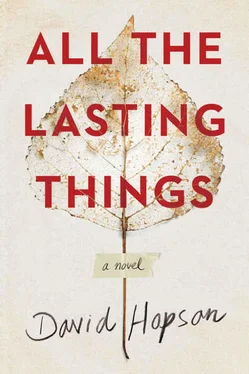“Life will always be disappointing,” he said with pressing emotion. “Even if everything looked exactly as you thought it would, even then, there would be disappointments. Deep, even ruinous disappointments. Compromises we think we can’t possibly live with. But we do. We do because we must. It’s the contract we sign for being here. We have to treat life like it’s precious. Even when we think it’s not. Especially then. Because then we see how easily it can be thrown away. Do you understand? We can’t have you doing anything like that ever again, Benji. Ever.” The few quiet tears that rolled down his face as he spoke surprised everyone, which was perhaps why he was in no hurry to wipe them away. They made a point that, in this family, whose silences and evasions Roger knew so well, needed making.
Benji felt a dull throb of remorse, but he’d padded himself well against the knowledge that his lie was often a source of great pain, and the shame at causing it failed to reach him where he lived. He sat like a statue, unmoving.
“We all have our to-be-or-not-to-be moment at one point or another,” Henry interrupted irascibly.
“Henry,” Roger warned.
“He’s here! Look, Leo, he’s sitting right here. With no complaints, except for me. Can we move on now?” Henry looked from his son to his wife to his oldest friend imploringly, as abashed as his character allowed him to be, which wasn’t very abashed at all. “Give me a break,” he said. “My watch is ticking twice as fast as everyone else’s; I don’t have the luxury of navel gazing.” But when no one answered, when no one so much as blinked, the sound of his fist coming down on the table rang out like cannon fire.
“It’s done!” he shouted. There was a salvaged air of lordliness in the pronouncement, the imperious brevity of it, the missing antecedent, the pause. “It’s done. It’s done, and I want you to read it.”
The stoical mask fell from Roger’s face first to reveal eyes ignited by the news, mouth agape. Neither he nor Evelyn nor Benji needed to be told what it was. It had lived among them, between them, sometimes on top of them, for the last eight years. “You said you’d given up on it.”
“And it was true. True enough: I never thought I’d finish. This last year, I’ve been lucky to get an hour a day when I feel sharp enough. When my mind feels like mine. One, maybe two hours a day. I couldn’t spend it listening to you claw at the door. I worked better when everyone thought I wasn’t working. No offense.”
Roger toasted Henry with his coffee mug.
“I had to finish. I couldn’t reconcile myself to the thought that you’d find three different drafts after I died and cobble them together with one of those awful forewords. The book he might have written, if only he had more time.”
“You know me better than that.”
“I would have haunted you if you did.”
“You finished the book, Henry. Christ!”
“Said the Jewish atheist.”
Roger clapped his hands together and bubbled over. “I’m thrilled. I couldn’t be happier. I’ll have it read by tomorrow. We’ll get Fanton on the phone. We’ll take care of the book. But, my God, man. I haven’t heard from you in months. I want to know how you are.”
“I just told you how I am.”
“You told me how the book is, Henry. You understand those are two different things? I’m asking about you .”
“Me.” Henry nodded gamely. “I’m in what they call ‘moderately severe cognitive decline.’ I love that ‘moderately severe.’ Like ‘passionately indifferent’ or ‘blithely miserable.’ My long, last march into the dark. What this means exactly varies with the hour. The other day the doctor asked me to count backward from twenty by twos. I looked at him like he wanted proof of Planck’s constant. I might lose track of the days of the week. Maybe I’ve forgotten my address. I can quote George Eliot but a minute later turn around and forget the word for ‘fork.’ Meaning ‘moderately severe.’ Meaning I’ve pissed myself, but I don’t need help wiping my ass. Yet. But that day’s coming. Is that what you had in mind?”
Roger’s eyes widened at the challenge as he sipped from his mug.
“And I never said anything about Bill Fanton. We’re not publishing it. Not while I’m here. Not now,” Henry continued. “I want you to read it. You, Leo. It goes no further than that.”
Roger leaned in with his left ear, as if he’d heard wrong. “You’ve lost me.”
“I need you to read it, to make it real. You. It goes no further than that.”
“Henry,” Roger began.
But Henry cut him off. “Publish it when I’m dead. Publish it as is when I’m dead. I can’t edit it. I don’t want to edit it. Or get drawn into which goddamn picture they pick for the cover. Or wake up even once in the night and wonder what the hell they’re saying about it.”
“You’ve never cared what critics have to say.”
“I’m not talking about critics.”
“Who then?”
Henry’s hand made a circle describing the room, the house, everything beyond. “How much time do I have, Leo? A few months? A year?”
“He still has his good days,” Evelyn interjected from the sink, where she scoured a skillet with renewed vigor.
“Only because she keeps lowering the bar,” Henry said coolly. “If I remember my phone number, it’s a banner day. No, Leo. The sun is going down. I feel it. Every day is a little bit hazier than the last. Soon there won’t be anything left to burn off the fog. Life in a cloud. I don’t get any say about that. But how I spend the few moments of clarity I have left, the scenery I opt to take in on my moderately severe descent, that I get to choose.” He shook his head and lowered his eyes. “I’m done, Leo. I’ve spent enough time wondering if this or that book is the one I was meant to write. Is this the one that will last, the one that will outlast me, or is it just another blip? The awards, the reviews, all the crap that every writer says he doesn’t care about? Well, we care. I care. And now I want a break.” At this, Henry reached into his shirt pocket and pulled out a stack of index cards. Some were blank. Some were filled with his tight, cramped script. He set off shuffling through them.
“What are those?” Leo asked.
When Henry didn’t answer, Evelyn did. “The death of me. He writes on them so he doesn’t forget. They’re like petals off the cherry tree. Everywhere you look. The other day, I slipped on one and nearly fell down the stairs.”
“Nobody fell down the stairs,” Henry reported, flipping through the cards with failing restraint. “Damn it. I know I put it in here.” Midway through his second pass, he found what he was looking for: a scrap of torn paper, ruled with thin blue lines and ragged on one side from the wire rings of a notebook. Henry trapped it between two fingers and held it out to Roger, shaking it like bait.
It read: 11-8-21-9 .
“What’s this?” Roger asked.
“The combination.”
“For the safe ? Henry. You promised me.”
“I never did.”
“What about the computer I bought you?”
“For my birthday,” Henry said, visibly proud of the memory.
“You told me you were using it.”
“I do use it. It’s a very nice place to tape my notes.”
“Dad likes being the only middle-class American without an e-mail address,” Benji chimed in. “It’s a point of honor.”
“You’re telling me you have one copy of the book?”
“Which you’ll read. And put back. And retrieve sometime in the not too distant future. When I’m gone.”
“I’m sorry, Henry, but you do know how stupid that is? In this day and age? Forget about the ease of writing. Forget that you can edit without blackening your fingers on typewriter ribbon. Typewriter ribbon! It’s plain reckless. You’re honestly telling me you have one copy of eight years’ work?”
Читать дальше












